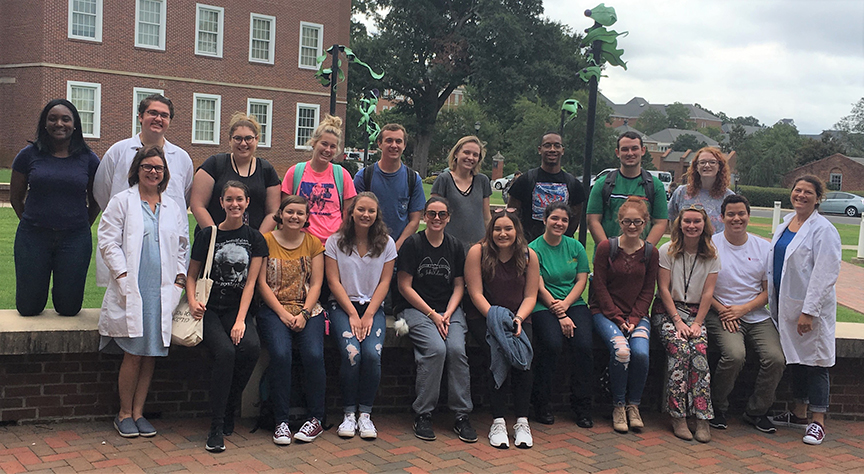
The initiative is being led by biology faculty members Dr. Vicky Frost and Dr. Kristi Westover, with the help of microscopist Dr. Julian Smith, after a successful grant application to the Howard Hughes Medical Institute to have Winthrop join a select group of schools around the country for the SEA-PHAGES project.
The SEA-PHAGES/SEA-GENE project began at Winthrop in the fall of 2016 with 10 freshmen completing the two-semester experience. Students enrolled in a special section of BIOL 203 (BIOL 203R) and continued in the spring taking a course in genome bioinformatics (BIOL 271). Both courses will be offered again in the coming academic year. Participating in the nationally acclaimed and much-admired SEA-PHAGES program is an exciting opportunity for Winthrop students and faculty.
The SEA Phage Hunters Advancing Genomics and Evolutionary Science, or PHAGES, project is built around a national experiment in bacteriophage genomics. Students isolate, name, sequence, and analyze newly-discovered mycobacteriophages that infect bacteria living in the local soil. Students make significant contributions to the field of genomics as they learn how to "think like scientists."
The national study was established in 2008 and is led by Professor Graham Hatfull as part of the Howard Hughes Medical Institute's (HHMI) Science Education Alliance (SEA). There are now over 100 different colleges and universities in the cohort across the USA with more than 7,000 undergraduates having experienced laboratory research as freshman scientists. This is a research program specifically aimed at first-year science majors with little or no background in college level biology as an alternative to the traditional introductory biology lab course.
It is a two semester course which exposes students to a number of laboratory experiences such as molecular biology, microbiology, microscopy and bioinformatics - all fundamental skills for the modern scientist. Winthrop's first-year biology students will be offered immediate hands-on involvement in genuine research. The intention is to motivate and engage this group of students as well as encourage them to continue in the field of science.
Our students will make exciting novel discoveries as well as contribute meaningfully to the body of scientific knowledge. Students and faculty gain the opportunity to present their research, network with other SEA members around the USA as well as be co-authors on peer-reviewed publications. The results are shared online with the research community and submitted to the National Center for Biotechnology Information GenBank database.
Students work on their research project under the guidance of two faculty members. You will leave the course with hands-on experience using techniques and tools of microbiology, molecular genetics, electron microscopy and state-of-the-art bioinformatics computer programs. You will collect novel data and contributing to our knowledge about bacterial viruses.
As a freshman you will be part of a national network of scientists, collaborating and sharing scientific knowledge. You could have the opportunity to attend regional SEA/HHMI seminars as well as the national seminar. Students may be contributing authors on a nationally or internationally renowned journal. You will have valuable and sought-after research experience in your very first year at Winthrop.
Applying to the SEA-PHAGES Project